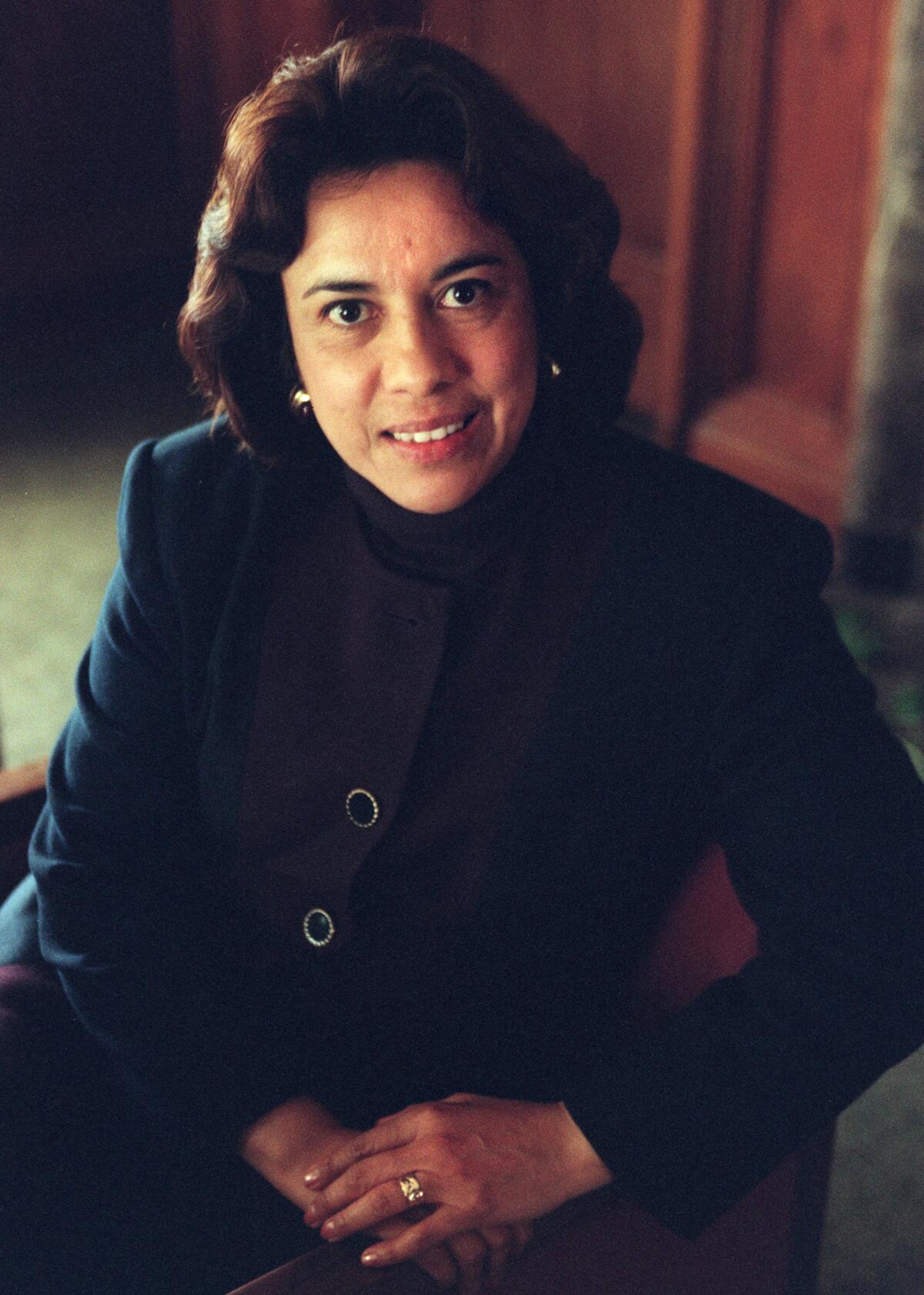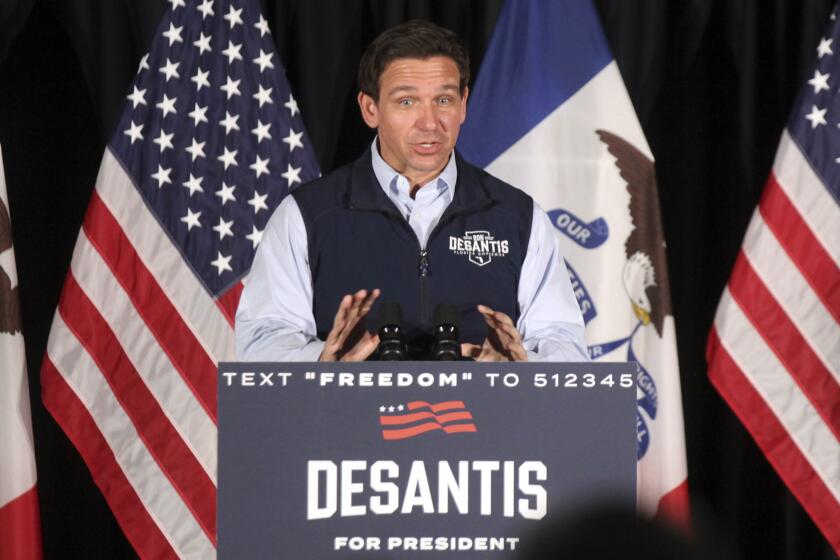Column: Gen Z and millennial Latinas fighting for social justice need to learn from Chicana legends
- Share via

The legendary Latinas who tore down many of last century’s barriers to civil rights are leaving public life or passing away.
A month after the death of the trailblazing Chicana leader Gloria Molina, her close friend and co-conspirator Antonia Hernández, 75, the president and CEO of the California Community Foundation, is preparing to retire this year.
This older generation of leaders has lessons for Gen Z and millennial Latinas fighting for social justice. I visited Hernández at her office this month to hear her insights for up-and-coming leaders. She wore pearl earrings, a matching necklace and the epic poise of a Mexican matriarch who’s used to winning her battles.
As head of the Mexican American Legal Defense and Education Fund (MALDEF), Hernández argued the redistricting lawsuit that led to the creation of Molina’s county supervisor district. She scored unprecedented victories for Latino voting rights, education and immigrant rights across the country. Her friend Molina — or “Glo” as she calls her — fought for working-class people in East Los Angeles as the first Latina on various political bodies: the California Assembly, L.A. City Council and L.A. County Board of Supervisors.
Both Chicanas developed reputations for speaking their minds. “Whether you liked us or not, there was nothing fake about us,” Hernández told me. “We’re not out to please people. We had a mission.”
At the same time, they knew how to put themselves in their opponents’ shoes and persuade them with strategic, behind-the-scenes conversations.
“I’ll work with the devil if he’ll take me where I want to go,” Hernández said.
They were often the only Latinas in the room. Today, Hernández worries about younger leaders’ phobia of reaching across the aisle and enduring discomfort. “You folks are much more sensitive about everything,” she said, giving me a withering stare. “Much more fragile.”
She recalled her friendship with the Republican Wyoming Sen. Alan Simpson. “The great nemesis of immigration,” she said with a smile. “He was my best friend.” The two fought viciously over policy, but only after asking about each other’s families. In the 1980s, her frenemy sponsored the bipartisan Immigration Reform and Control Act (IRCA), a historic bipartisan bill that allowed millions of people to legalize their immigration status and step out of the shadows.
Hernández and immigrant rights organizations actually lobbied against the bill because it included employer sanctions, which they saw as too big of a concession to Republicans — one that would fuel discrimination against Latinos. Luckily, they didn’t kill the bill. It passed in 1986. Now, Hernández sees it as one of her greatest achievements, the imperfect culmination of years of wrangling with conservatives from her time as the first Latina counsel to the Senate Judiciary Committee.
The former president’s pledge to end birthright citizenship is a new low, but it is unlikely to be the end.
She recalls that when she didn’t want to compromise, her one-time boss Sen. Edward Kennedy (D-Mass.) gave her good advice: “Take half a loaf today, ‘cause tomorrow we’re going after the other half.”
But Congress has failed to pass immigration protections in the four decades since. Every time there’s a bipartisan bill, ideologues on the left or the right derail it, refusing to compromise. This has even been the case when Democrats have had a majority. Meanwhile, millions of people are being deported.
Hernández fears people have forgotten the importance of building relationships with opponents and being flexible. Some of her biggest victories came when she settled for less than she wanted, including legal settlements in landmark cases. The negotiations required empathy for her adversaries. “To be a really good litigator you have to put yourself in the other person’s shoes to counter what they’re going to say or do,” she said. “And then you figure out where the alignment is.”
She thinks young leaders are repeating the same mistakes she once made. She has advice for them: “Politics works when you give and take. And if you’re not willing to give, nobody’s going to give you anything!”
The proliferation of bad-faith Republican politicians has made it harder to work across the aisle. But Hernández thinks young people, including Latinas, have to try.
If Gen Z Republicans are attacked as bigots, they’re more likely to double down on harmful beliefs, including the idea that they’re victims of oppression.
Many Latinas are practiced in the art of crossing borders: cultural, linguistic or otherwise. Why not use this gift? Hernández did, and still does. “You know, like right now, I’m trying to get a hold of the president director of the Koch brothers foundation,” she told me. I was confused. “Why?” I asked. “Money!” she replied. “Partnership! They fund immigration. They fund scholarships.”
She leaned forward and made a sewing gesture with her hands: “Like I said: You find the common thread, and you begin to weave it,” she said.
It’s this unrelenting approach to collaboration that let her increase the California Community Foundation’s endowment from $550 million to its current $2.4 billion. “I can beg from whomever if it’s for a cause,” she said.
But Hernández is ready to prioritize time with her granddaughters and husband. She’ll still be on multiple boards, but she’ll be cooking and gardening more.
She’s hoping that young Latinas will move toward the middle in order to pull people to the left, whether it’s national celebrities like Rep. Alexandria Ocasio-Cortez (D-N.Y.) or rising local voices in L.A. inspired by Molina. Even Molina, maligned as too angry, sought to be practical; she criticized the waving of Mexican flags at immigrant rights marches because it alienated moderates.
Young Latinas are about to gain more power in L.A. leadership with either Imelda Padilla or Marisa Alcaraz, Mexican American millennials, on the City Council, depending on the outcome of the June 27 election for the 6th district. Both believe in working with colleagues and constituents, regardless of their beliefs. “You can’t just shut out a whole group of people because you disagree with their opinion,” Alcaraz told me. Padilla said: “I want to be a practical progressive.”
Eunisses Hernandez, who was elected to the City Council last fall, has a more ideological style. But she, too, believes in building coalitions across difference. “I can work with anyone,” she told me. “It just won’t be on everything.”
She met Molina while protesting the L.A. County Board of Supervisors’ plan to build new county jails years ago. She was inspired by Molina, but wanted to break her generation’s pattern of investing in incarceration.
Despite some differences, all three of these young Latina leaders want to carry on the legacy of the women who opened doors for them — primarily by making sure they’re opening doors for the next generation of Latinas. Padilla told me: “You’re not really a leader unless you’re growing the next wave of leaders.”
As they look to the future, young Latinas mustn’t forget the lessons of the past: Their predecessors achieved the impossible because they bridged divides.
More to Read
A cure for the common opinion
Get thought-provoking perspectives with our weekly newsletter.
You may occasionally receive promotional content from the Los Angeles Times.














